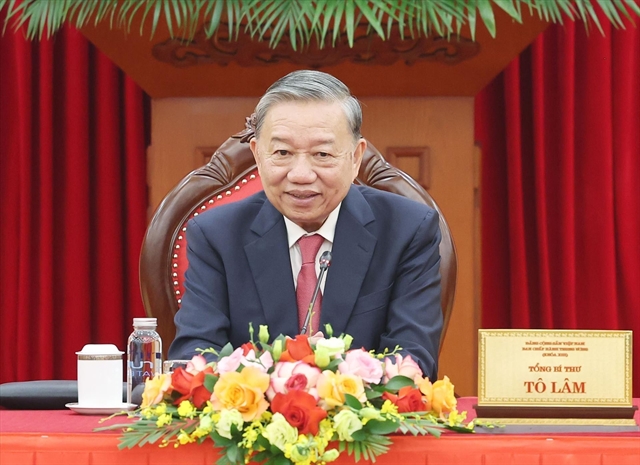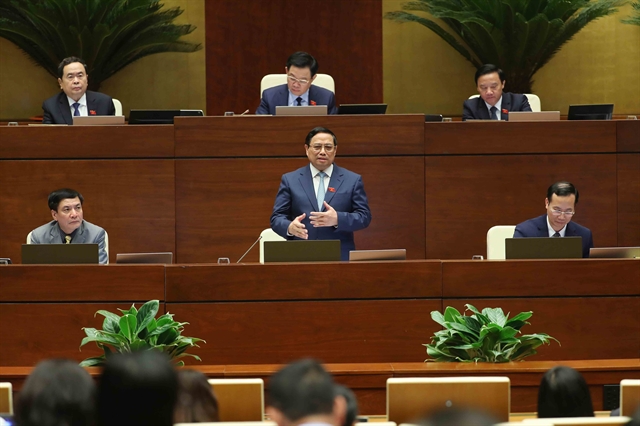 Politics & Law
Politics & Law

 |
| Prime Minister Phạm Minh Chính speaks at the question and answer session on Wednesday. — VNA/VNS Photo |
HÀ NỘI — Prime Minister Phạm Minh Chính said the Government would continue to implement tasks and solutions across various sectors to achieve the highest targets of the 2023 plan, including a Gross Domestic Product (GDP) growth of over 5 per cent.
He made these statements regarding the socio-economic development situation for the first nine months and the full-year 2023 forecasts during the question and answer session of the ongoing sixth meeting of the 15th National Assembly (NA) on Wednesday.
PM Chính mentioned that the socio-economic situation in October continued to show positive trends. However, businesses still faced challenges in their operations, youth unemployment rates remained high, and natural disasters continued to significantly impact the central region.
The Prime Minister further stated that for the remaining months of 2023, the Government would focus on boosting growth drivers, implementing supportive policies to increase aggregate demand, especially in terms of fiscal and monetary policies, enhancing credit accessibility, land resources, expanding markets, diversifying products, and strengthening supply chains.
The Government would accelerate the disbursement of public investment capital, attract social, private and foreign investment while ensuring price stability and market stability, especially for essential goods. It will also closely monitor the developments in the international and domestic situations for effective policy responses to emerging issues, he added.
Regarding the review and enhancement of laws and regulations as well as administrative procedure reforms aimed at overcoming difficulties in production and business, PM Chính concurred with the opinions of NA deputies that some legal provisions, mechanisms, and policies were no longer suitable.
The Government would instruct ministries, sectors, and localities to continue reviewing and addressing legal obstacles, especially in areas related to land pricing, housing, real estate, planning, bidding, investment, construction, and simplifying business conditions and administrative procedures concerning project evaluation and approval. This included administrative procedures that directly affected citizens and businesses.
Leaders of ministries, sectors, and localities would be required to take direct leadership and responsibility for legal building work and administrative reform.
In addition, PM Chính said there would be a push for decentralisation and delegation of authority linked to resource allocation, enhancing the capacity at lower levels, and strengthening the monitoring and control of power.
Commenting on the progress of important transportation infrastructure projects, PM Chính stated that some projects were still lagging behind, facing budget constraints, and having fragmented bidding packages. Others faced difficulties in land clearance, resettlement, and the supply of construction materials.
He said the Government would review and improve regulations, especially those related to investment procedures and ODA capital procedures; and expedite land clearance and resettlement, resolve difficulties regarding toll roads, bypass roads, and intersections for the people; and promptly address challenges and issues related to construction materials, particularly in the Mekong Delta region.
The Government would strive to achieve the goal of completing at least 3,000 kilometres of expressways as set out in the Resolution of the 13th Party Congress by the end of its term, he stressed.
In response to NA deputies’ questions about energy security, PM Chính mentioned that there were localised power shortages in the northern region at the end of May and the beginning of June this year.
The Government has firmly directed several solutions, including urgently issuing the Power Development Plan VIII, reviewing and improving the framework for the development of renewable energy in line with the spirit of Resolution No55 of the Party Central Committee, expediting the construction of a 500 kV power line from the central to the northern region, promptly improving the competitive electricity market, the mechanism for direct power purchase, and the incentives for developing self-generated and self-consumed rooftop solar power.
Regarding high-quality human resource training, PM Chính affirmed that this was one of the three strategic breakthroughs and a top national policy. The Government would review and improve mechanisms and policies to achieve a breakthrough in the development of high-quality human resources, especially a cadre of experts, scientists, and highly skilled workers both domestically and abroad.
Priority would be given to allocating resources to train high-quality human resources for emerging fields such as digital transformation, artificial intelligence, semiconductors, and clean energy transition, he said.
The Prime Minister also addressed the urgent issue of shortages of medicines, medical equipment, and supplies. He said the Government has proposed amendments to the NA to revise and supplement laws related to bidding, pricing, medical examination, treatment, and resolutions that allow the extension of the registration of expired drugs.
The Government has also issued a resolution on ensuring medicines and medical equipment and provided guidance on resolving issues in bidding, drug procurement, and health insurance payments.
Additionally, he said, it would continue to promote the strong development of the pharmaceutical and medical equipment industry, with a focus on building new healthcare facilities to reduce hospital overcrowding and improve the quality of healthcare.
According to the Prime Minister, the five targets, including the rate of GDP growth, per capita GDP, the share of manufacturing and processing industries in GDP, the rate of social labour productivity growth, and the proportion of the agricultural workforce in the total social labour force, would be challenging to achieve according to the plan.
To achieve these targets, the Government has directed efforts to promote economic structural transformation in line with the transition to a modern and industrialised growth model. There would be a focus on the structural transformation within the agriculture sector, and investments would be made to develop a modern and comprehensive infrastructure system to boost regional connectivity, leveraging the role of the six economic-social regions, and creating new drivers for rapid and sustainable development, he said. — VNS